反义疑问句PPT
合集下载
高考英语语法——反意疑问句(共11张PPT)
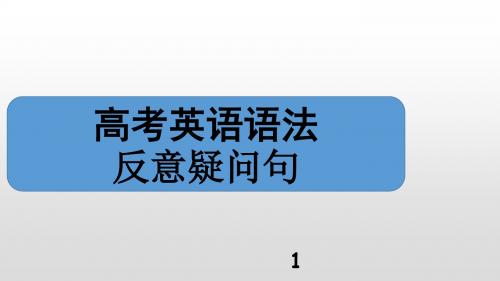
9
当陈述句部分含有主从复合句时,附加部分的代词和助动词 须与主句中的主谓保持一致。
You needn't do it since he has finished it, need you? It's the second time that you have sung that song, isn't it?
ome, shall we?
Let us go home, will you?
Open the door, will you?
5
need和dare既可以用作情态动词,又可以用作行为动词,所以在反意疑 问句中要准确判断其是情态动词还是行为动词。
He needn’t do it again, need he? He doesn’t need to do it again, does he? She dare say it, daren’t she? She doesn’t dare to say it, does she?
2
构成
The car is your father's, The girl doesn't sleep, The doctor can help you,
陈述句
isn't it? does she? can't he?
反意疑问句
be动词/情态动词/助动词 (not)+主语(代词)
3
前肯后否 前否后肯
He thinks that it will rain tomorrow, doesn't he? I think that it will rain tomorrow, won't it? They don't suppose that the film is moving, do they?
当陈述句部分含有主从复合句时,附加部分的代词和助动词 须与主句中的主谓保持一致。
You needn't do it since he has finished it, need you? It's the second time that you have sung that song, isn't it?
ome, shall we?
Let us go home, will you?
Open the door, will you?
5
need和dare既可以用作情态动词,又可以用作行为动词,所以在反意疑 问句中要准确判断其是情态动词还是行为动词。
He needn’t do it again, need he? He doesn’t need to do it again, does he? She dare say it, daren’t she? She doesn’t dare to say it, does she?
2
构成
The car is your father's, The girl doesn't sleep, The doctor can help you,
陈述句
isn't it? does she? can't he?
反意疑问句
be动词/情态动词/助动词 (not)+主语(代词)
3
前肯后否 前否后肯
He thinks that it will rain tomorrow, doesn't he? I think that it will rain tomorrow, won't it? They don't suppose that the film is moving, do they?
反义疑问句(共14张PPT)
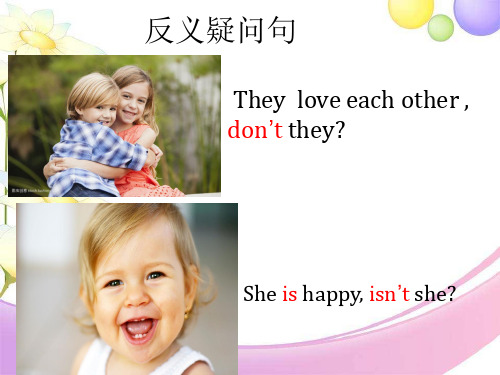
+ You have to believe in yourself. That's the secret of success. 人必须相信自己,这是成功的秘诀。
+
特殊用法2-----There be 句型
陈述部分是“there be”结构时,疑问部分用be there。
There is something wrong with your watch, isn't there?
Summary
一、反义疑问句的结构: 前肯+后否 ;前否+后肯
二、反义疑问句的四种特殊用法 1、祈使句的反义疑问句 2、There be 句型的反义疑问句 3、陈述部分有hardly等词时,提问用肯定形式。 4、反义疑问句的回答(根据事实)
Thanks for listening! Goodbye!
Chinese,_c_a_n___h_e___? 6.Please call me,_w__o_n_’t_y_o_u__?
7.Let’s go home, s_h__a_l_l_w__e__ ?
8.Let us go home,w__i_l_l_y_o__u__?
9.Don’t play on the road,w__i_l_l_y__o_u_?
2、Let‘s 开头的祈使句,后用shall we? 而Let us 开 头的祈使句,后用will you ?
+9、要学生做的事,教职员躬亲共做;要学生学的知识,教职员躬亲共学;要学生守的规则,教职员躬亲共守。2024/3/72024/3/7Thursday, March 07, 2024 +10、阅读一切好书如同和过去最杰出的人谈话。2024/3/72024/3/72024/3/73/7/2024 1:35:33 PM +11、只有让学生不把全部时间都用在学习上,而留下许多自由支配的时间,他才能顺利地学习……(这)是教育过程的逻辑。2024/3/72024/3/72024/3/7Mar-247-Mar-24 +12、要记住,你不仅是教课的教师,也是学生的教育者,生活的导师和道德的引路人。2024/3/72024/3/72024/3/7Thursday, March 07, 2024
+
特殊用法2-----There be 句型
陈述部分是“there be”结构时,疑问部分用be there。
There is something wrong with your watch, isn't there?
Summary
一、反义疑问句的结构: 前肯+后否 ;前否+后肯
二、反义疑问句的四种特殊用法 1、祈使句的反义疑问句 2、There be 句型的反义疑问句 3、陈述部分有hardly等词时,提问用肯定形式。 4、反义疑问句的回答(根据事实)
Thanks for listening! Goodbye!
Chinese,_c_a_n___h_e___? 6.Please call me,_w__o_n_’t_y_o_u__?
7.Let’s go home, s_h__a_l_l_w__e__ ?
8.Let us go home,w__i_l_l_y_o__u__?
9.Don’t play on the road,w__i_l_l_y__o_u_?
2、Let‘s 开头的祈使句,后用shall we? 而Let us 开 头的祈使句,后用will you ?
+9、要学生做的事,教职员躬亲共做;要学生学的知识,教职员躬亲共学;要学生守的规则,教职员躬亲共守。2024/3/72024/3/7Thursday, March 07, 2024 +10、阅读一切好书如同和过去最杰出的人谈话。2024/3/72024/3/72024/3/73/7/2024 1:35:33 PM +11、只有让学生不把全部时间都用在学习上,而留下许多自由支配的时间,他才能顺利地学习……(这)是教育过程的逻辑。2024/3/72024/3/72024/3/7Mar-247-Mar-24 +12、要记住,你不仅是教课的教师,也是学生的教育者,生活的导师和道德的引路人。2024/3/72024/3/72024/3/7Thursday, March 07, 2024
反意疑问句ppt课件

• Jack wasn’t playing soccer, _w__a_s _h_e___? • Their parents have gone to London,
__h_a_v_e_n_’_t t_h_e_y__? • I have never been to the park, __h_a_v_e_n’_t_I__? • You have a good friend, __d_o_n_’t_y_o_u___? • We had a meeting, __d_i_d_n_’t_w_e___?
Grammar: 反意疑问句
一、定义:
当我们陈述了一个事实,而又不是很 有把握,就可以在陈述句后加一个简 短问句,称为反意疑问句。它表示提 问人的看法,没有把握,需要对方证 实。反义疑问句由两部分组成:前一 部分是一个陈述句,后一部分是一个 简短的疑问句,两部分的人称时态应 保持一致。
二、结构:
结构一: 前肯,+ 后否 eg. She is a student, isn’t she?
结构二: 前否,+ 后肯 eg. She isn’t a student, is she?
三、反意疑问句的解答步骤
1. 判定(判断该用肯定还是否定); 2. 找动(找句子的助动词:be用be,动词原形do, 三单does,过去did,完成have); 3. 换代(将主语换为人称代词);
2. 一般动词(play, study, watch 等)句型:
现在 主语+play/plays…, don’t (doesn’t) + 主语? 过去 主语+played…, didn’t + 主语?
1 Your mother likes cooking ,_d__o_e_s_n_’t_s_h_e___? 2 He has an apple, __d_o_e_s_n_’_t _h_e____? 3 The plane took off an hour ago, __d_i_d_n_’t_i_t___? 4 He didn’t go to school late this morning,
完整反义疑问句课件

如果陈述句是肯定的,反义疑问句应该是否定的。
2 人称一致
陈述句和反义疑问句中的主语和动词人称要保持一致。,避免使用复杂的句子结构。
结束语
通过学习反义疑问句的结构和用法,我们可以更好地理解和运用这个表达方 式,提升我们的语言表达能力。
完整反义疑问句PPT课件
PPT介绍反义疑问句
什么是反义疑问句?
反义疑问句是指一种用于提问或表示疑问的句子结构,通常由一个陈述句和一个反义疑问句构成。
反义疑问句的结构
1
陈述句部分
包含陈述句的主谓宾结构
2
反义疑问句部分
由一个助动词和一个否定词构成
3
连接词
连接陈述句和反义疑问句的部分,常用的连接词包括but和yet
反义疑问句的语气和语调
语气
反义疑问句通常用于表示疑问、请求或强调某 种认可的语气。
语调
反义疑问句通常以升调结尾,以引起对方的回 答或注意。
反义疑问句的用法与例句
询问意见
这个计划听起来很好,不是吗?
表示认可
你很喜欢这部电影,对吗?
确认信息
你不会去参加聚会,对吗?
反义疑问句的注意事项
1 肯定陈述,否定反义疑问
2 人称一致
陈述句和反义疑问句中的主语和动词人称要保持一致。,避免使用复杂的句子结构。
结束语
通过学习反义疑问句的结构和用法,我们可以更好地理解和运用这个表达方 式,提升我们的语言表达能力。
完整反义疑问句PPT课件
PPT介绍反义疑问句
什么是反义疑问句?
反义疑问句是指一种用于提问或表示疑问的句子结构,通常由一个陈述句和一个反义疑问句构成。
反义疑问句的结构
1
陈述句部分
包含陈述句的主谓宾结构
2
反义疑问句部分
由一个助动词和一个否定词构成
3
连接词
连接陈述句和反义疑问句的部分,常用的连接词包括but和yet
反义疑问句的语气和语调
语气
反义疑问句通常用于表示疑问、请求或强调某 种认可的语气。
语调
反义疑问句通常以升调结尾,以引起对方的回 答或注意。
反义疑问句的用法与例句
询问意见
这个计划听起来很好,不是吗?
表示认可
你很喜欢这部电影,对吗?
确认信息
你不会去参加聚会,对吗?
反义疑问句的注意事项
1 肯定陈述,否定反义疑问
新概念英语第三册反义疑问句课件

It must have rained last night, did’t it?
昨晚一定下雨了,是吗?
②主语+must have done, haven’t +主语?
(无明显过去的时间)
It must have rained, hasn’t it?
一定下雨了,是吗?
特别注意(2):ought to
There is a cup on the table, isn’t there?
桌上有一个杯子,不是吗,不是吗?
3.陈述部分主语为指示代词,疑问部分主语用it/they
This is a book, isn’t it?
this/that→it
这是一本书,不是吗?
These are your friends , aren’t they?
(be动词与主语保持一致)
He must be an actor, isn’t he?
他一定是个演员,不是吗? They must be friends, aren’t they? 他们一定是朋友,不是吗?
2.对过去的推测
①主语+must have done, didn’t +主语? (有明显过去的时间)
这谁也不怨,对不对?
Everyone is having a good time, aren’t they?
每个人都玩的很开心,不是吗?
5.陈述部分主语为复合不定代词(物)疑问部分主语 用it.
Everything is ready. Isn’t it ?
一切都准备好了。是吗?
something, anything,nothing, everything等
陈述部分ought to,疑问部分 should’t/oughtn’t He ought to know what to do, oughtn’t/shouldn’t he? 他应该知道该做什么,不是吗?
昨晚一定下雨了,是吗?
②主语+must have done, haven’t +主语?
(无明显过去的时间)
It must have rained, hasn’t it?
一定下雨了,是吗?
特别注意(2):ought to
There is a cup on the table, isn’t there?
桌上有一个杯子,不是吗,不是吗?
3.陈述部分主语为指示代词,疑问部分主语用it/they
This is a book, isn’t it?
this/that→it
这是一本书,不是吗?
These are your friends , aren’t they?
(be动词与主语保持一致)
He must be an actor, isn’t he?
他一定是个演员,不是吗? They must be friends, aren’t they? 他们一定是朋友,不是吗?
2.对过去的推测
①主语+must have done, didn’t +主语? (有明显过去的时间)
这谁也不怨,对不对?
Everyone is having a good time, aren’t they?
每个人都玩的很开心,不是吗?
5.陈述部分主语为复合不定代词(物)疑问部分主语 用it.
Everything is ready. Isn’t it ?
一切都准备好了。是吗?
something, anything,nothing, everything等
陈述部分ought to,疑问部分 should’t/oughtn’t He ought to know what to do, oughtn’t/shouldn’t he? 他应该知道该做什么,不是吗?
反义疑问句归纳总结.ppt

The Swede made no answer, did he / she? Some plants never blown, do they ?
There are few apples in the basket, are there?
He can hardly swim, can he?
They seldom come late, do they?
He is not the man who gave us a talk, is he? He said he wanted to visit Japan, didn't he?
c. 上述部分主句谓语是I ;we think, believe, expect, suppose, imagine 等引 导的宾语从句,疑问部分与宾语从句相 对应构成反意疑问句。
to you in English, does she? She rarely speaks
4)含有ought to 的反意疑问句,陈述 部分是肯定的,疑问部分用shouldn't / oughtn't +主语。
He ought to know what to do, oughtn't he? / shouldn't he?
Either you or he is right,_is_n_’_t_h_e_?
13)陈述部分主语是指示代词或不定代 词 everything, that, this nothing, 疑问 部分主语用 it 。
Everything is ready, isn't it?
14)陈述部分为主语从句或并列复合句, 疑问部分有三种情况s Mr. Smith had been to Beijing for several times, he should have been in China now, shouldn't he?
There are few apples in the basket, are there?
He can hardly swim, can he?
They seldom come late, do they?
He is not the man who gave us a talk, is he? He said he wanted to visit Japan, didn't he?
c. 上述部分主句谓语是I ;we think, believe, expect, suppose, imagine 等引 导的宾语从句,疑问部分与宾语从句相 对应构成反意疑问句。
to you in English, does she? She rarely speaks
4)含有ought to 的反意疑问句,陈述 部分是肯定的,疑问部分用shouldn't / oughtn't +主语。
He ought to know what to do, oughtn't he? / shouldn't he?
Either you or he is right,_is_n_’_t_h_e_?
13)陈述部分主语是指示代词或不定代 词 everything, that, this nothing, 疑问 部分主语用 it 。
Everything is ready, isn't it?
14)陈述部分为主语从句或并列复合句, 疑问部分有三种情况s Mr. Smith had been to Beijing for several times, he should have been in China now, shouldn't he?
反义疑问句详细讲解课件(PPT27张)
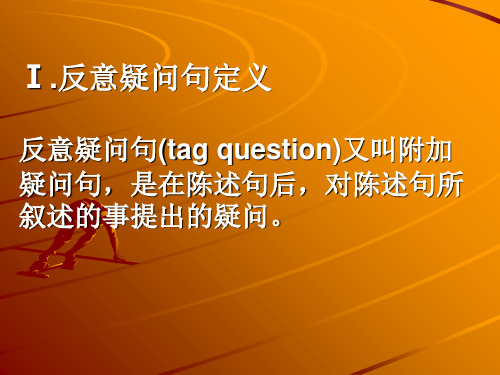
I don’t believe he has finished his work.
7.当陈述部分的主句是I think (expect, believe)等结构时,反 意疑问句的附加部分则往往与从 句中的主语和谓语动词保持对应 关系,但要注意否定的转移。 例如:
I think he’s funny, isn’t he? I don’t believe she likes my
You must have seen the film last week, didn’t you?
6. 当陈述部分是I am…时,反意疑 问句部分通常要用aren’t I;如陈述 句部分的主语是I am not时,反意疑 问句部分通常要用am I。 例如:
1)I am a teacher, aren’t I?
Ⅰ.反意疑问句定义
反意疑问句(tag question)又叫附加 疑问句,是在陈述句后,对陈述句所 叙述的事提出的疑问。
Ⅱ.基本结构:
陈述句+逗号+简短的一般疑问句?
遵循前肯定后否定前否后肯式的原则
①前肯后否式。例如:
You are all students, aren’t you﹖
②前否后肯式。例如:
Let’s have a rest, shall we? 以let us开头的祈使句,不包括 说话人在内,因此反意疑问句的 附加部分用will you。例如:
Let us stop now, will you?
Ⅳ. 反意疑问句的回答 “ 根据事实回答”
对反意疑问句的回答,无论问题的提法如何,如果 事实是肯定的,就用yes,事实是否定的,就要用no。 要特别注意陈述句部分是否定结构,反意疑问句部分 用肯定式提问时,回答yes或no与汉语正好相反。这 种省略回答的yes要译成“不”,no要译成“是”。
7.当陈述部分的主句是I think (expect, believe)等结构时,反 意疑问句的附加部分则往往与从 句中的主语和谓语动词保持对应 关系,但要注意否定的转移。 例如:
I think he’s funny, isn’t he? I don’t believe she likes my
You must have seen the film last week, didn’t you?
6. 当陈述部分是I am…时,反意疑 问句部分通常要用aren’t I;如陈述 句部分的主语是I am not时,反意疑 问句部分通常要用am I。 例如:
1)I am a teacher, aren’t I?
Ⅰ.反意疑问句定义
反意疑问句(tag question)又叫附加 疑问句,是在陈述句后,对陈述句所 叙述的事提出的疑问。
Ⅱ.基本结构:
陈述句+逗号+简短的一般疑问句?
遵循前肯定后否定前否后肯式的原则
①前肯后否式。例如:
You are all students, aren’t you﹖
②前否后肯式。例如:
Let’s have a rest, shall we? 以let us开头的祈使句,不包括 说话人在内,因此反意疑问句的 附加部分用will you。例如:
Let us stop now, will you?
Ⅳ. 反意疑问句的回答 “ 根据事实回答”
对反意疑问句的回答,无论问题的提法如何,如果 事实是肯定的,就用yes,事实是否定的,就要用no。 要特别注意陈述句部分是否定结构,反意疑问句部分 用肯定式提问时,回答yes或no与汉语正好相反。这 种省略回答的yes要译成“不”,no要译成“是”。
完整反义疑问句课件

04
反义疑问句的回答
肯定回答
要点一
肯定回答时,通常使用“Yes”来 回答反义疑问句,并重复…
You like apples, don’t you? 回答:Yes, I do.
要点二
如果对反义疑问句中的否定部分 进行强调,可以使用“Yes…
You didn’t go to the party, did you? 回答:Yes, I did.
详细描述
反义疑问句是一种常见的语法结构,通常用于表达说话者的 态度、观点或对某件事情的疑问。它的特点是前半部分是一 个肯定或否定的陈述句,而后半部分则通过疑问的形式表达 相反的意思。
类型
总结词
反义疑问句可以分为两种类型,即标准反义疑问句和非标准反义疑问句。
详细描述
标准反义疑问句的前半部分是一个肯定句,后半部分是一个否定疑问句;或者 前半部分是一个否定句,后半部分是一个肯定疑问句。而非标准反义疑问句则 不遵循这一规则,前后两部分没有明显的相反意思。
总结词
表示某些特殊情况或特殊用法,需要特 别注意。
VS
详细描述
在某些特殊情况下,反义疑问句的用法可 能会发生变化。例如,当陈述句为祈使句 时,反义疑问句通常会省略主语;当陈述 句为感叹句时,反义疑问句通常会省略疑 问词。此外,还有一些特殊的反义疑问句 结构,如“他不是学生吗?”等,需要特 别注意其用法和含义。
否定回答
要点一
否定回答时,可以使用“No”来 回答反义疑问句,并重复疑…
You don’t like coffee, do you? 回答:No, I don’t.
要点二
如果对反义疑问句中的肯定部分 进行强调,可以使用“No,…
You went to the concert, didn’t you? 回答:No, I didn’t.
人教版英语八年级上册-Unit 10 反义疑问句(课件)

I think you are right, aren’t you?
I don’t believe he studies harder, does he?
He never said he was a good student, did he?
四.陈述部分主语是 everyone, everybody, someone, somebody, anybody, no one, nobody等时, 疑问部分用 they/he;陈述部分是everything, something, nothing, anything 时,疑问部分用 it .
5. Please call me, ____________? 6.Don’t be late next time, __________?
2.在Let’s祈使句后加上 shall we? shan’t we? 在Let us(me, him..) 后加上 will you? 或
won’t you?
二.陈述部分是I am 或 I’m 时,疑问部分用 aren’t I.
I am having an English lesson, __a_re_n_’_t_I__?
三.宾语从句中,以主句为准,但如果主语是第一人称 (I/We)且谓语动词是think, believe, guess, suppose 时, 以从句为准.
These are your friends, aren’t they?
注意
1.前否后肯要根据事实来回答,事实是肯定的用 Yes.事实是否定的用No.
2.前否后肯的Yes译为“不”,No译为“是的”。
1.You aren’t a teacher, are you?你不是老师,是吗? Yes, I am. 不,我是。/ No, I’m not.是的,我不是。
I don’t believe he studies harder, does he?
He never said he was a good student, did he?
四.陈述部分主语是 everyone, everybody, someone, somebody, anybody, no one, nobody等时, 疑问部分用 they/he;陈述部分是everything, something, nothing, anything 时,疑问部分用 it .
5. Please call me, ____________? 6.Don’t be late next time, __________?
2.在Let’s祈使句后加上 shall we? shan’t we? 在Let us(me, him..) 后加上 will you? 或
won’t you?
二.陈述部分是I am 或 I’m 时,疑问部分用 aren’t I.
I am having an English lesson, __a_re_n_’_t_I__?
三.宾语从句中,以主句为准,但如果主语是第一人称 (I/We)且谓语动词是think, believe, guess, suppose 时, 以从句为准.
These are your friends, aren’t they?
注意
1.前否后肯要根据事实来回答,事实是肯定的用 Yes.事实是否定的用No.
2.前否后肯的Yes译为“不”,No译为“是的”。
1.You aren’t a teacher, are you?你不是老师,是吗? Yes, I am. 不,我是。/ No, I’m not.是的,我不是。
《反义疑问句》课件

提供一些实际例子,引导听众分析和理解反义疑问句的适用场景。
2
练习及反馈
设计题目供听众练习反义疑问句的运用,并提供实时反馈和解析。
结语
反义疑问句的重要性和使用 价值
总结反义疑问句在语言表达中的重要性和应 用价值。
希望大家能够运用反义疑问 句更好地沟通交流。
什么是反义 疑问句?
解释反义疑问句的 定义和作用,引起 听众的兴趣和好奇。
反义疑问句 的组成结构
解析反义疑问句的 构成要素,加深理 解和记忆。
反义疑问句 的附加疑问 部分形式
介绍反义疑问句中 常见的附加疑问部 分形式,提供实例 加深印象。
反义疑问句 的特点与注 意事项
探讨反义疑问句的 独特特点和注意事 项,帮助听众正确 运用。
《反义疑问句》PPT课件
反义疑问句PPT课件,通过精心设计的幻灯片,详细阐述反义疑问句的基本 语法与使用场景,帮助大家更好地运用反义疑问句进行沟通交流。
概述
基本语法与特点
掌握反义疑问句的基本语法和特点,提高语 言表达的灵活性。
使用场景
了解反义疑问句的应用场景,拓宽交流和表 达的方式。
反义疑问句的基本语法与特点
反义疑问句的使用场景
常见的反义疑问句应用 场景
反义疑问句在交流中的 作用
列举常见的日常对话和情境, 逐一讲解如何使用反义疑问句。
阐述反义疑问句在有效沟通中 的作用和价值,引发思考和一些技 巧和注意事项,提高语言表达 的准确性。
练习与实践
1
反义疑问句实例分析
英语语法反义疑问句ppt

祈使句的反意疑问句
肯定的祈使句:won’t you ? / will you ? 祈使句的反意疑问句
否定的祈使句:will you ? 注:Let’s … , shall we?
Let us…, will you? e.g. Let us go to watch the movie, will you ? Let’s walk to the shops instead of taking the car, shall we ? Don't play computer games, will you?
B. is she
C. did she C. hasn’t he C. did she C. don’t they C. hasn’t she
D. wasn’t she D. doesn’t he D. didn’t she D. will they D. has she
6. There won’t be any concert this Saturday evening, C ?
A. will there not
B. will there C. is there
D. won’t there
7. He dislikes the two subjects, B he?
A. does
B. doesn’t
C. is
8. Let’s go there by bus, B ?
D. isn’t
特殊的反意疑问句
特殊的反意疑问句: (1) 主+ used to do sth, didn't/usedn't+主?
She used to get up at 7 o'clock, didn't/usedn't she ?
反义疑问句课件
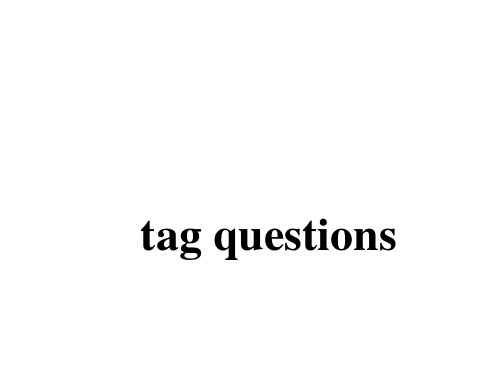
特殊使用方法2 情态动词旳反义疑问句
• 1) He can play the piano,_c_a_n_’t_h_e___? • 2) He should go right now, _s_h_o_u_ld_n_’_t_h_e? • 3)They can’t finish it, _c_a_n_t_h_e_y____?
其他动词:
1. You will go to America, w__o_n_’_t_ y_o__u ? 2. We have ever been to Shanghai,
__h_a_v_e_n__’t_ __w_e___ ?
特殊使用方法1 ---祈使句旳反意疑问句:
陈说句为 “Let’s…” 构造时, 表达提议,其意思 涉及对方,即“让我们(你我双方)”附加问句一 般用 “shall we?” 。
• I don’t think they are friends, are they?
Jay sings many songs, doesn’t he ? Yes, he does.
Lily was ill in bed, _w_a_s_n_’t_s_he__?
Yes, she was.
She wasn’t at home, _w_as__sh_e__?
No, she wasn’t.
特殊使用方法3---There be句型旳反意疑问句。
陈说句为There be构造时,附加问句仍用there。
• 1.There is a famous doctor in your hometown,
__is_n__’t__t_h_e_r_e___?
Yes, there is.
• 2.There will not be any classes tomorrow,
反义疑问句(25张PPT)初中英语专项复习课件

Yes, they were.
【典例1】John had a short walk after lunch, _______?
A. did he
B. didn't he
C. had he
D. hadn't he
考查反义疑问句。反义疑问句遵循的原则为“前肯,后否;前否,后 肯”,得出疑问句部分为否定形式。陈述句部分为一般过去时,需用 助动词did来反问,故答案选B。
No, she hasn’t.
易错点2
常见时态的反义疑问句
一 般 过 去 时
She wasn’t at home, _w_a_s_s_h_e_? No, she wasn’t.
易错点2
常见时态的反义疑问句
一 般 过 去 时
They weren’t in the park last Sunday, _w_e_r_e_t_h_e_y_?
前肯 前否
后否 后肯
“是吗?” “是不是?” “这是真的吗?” “你同意吗?”
注意
附加疑问句= be、助动词、情态动词+人称代词主格
易错点1
反义疑问句的回答
Yes, 主语 + be动词/情态动词/助动词 No,主语 + be动词/情态动词/助动词 + not
易错点2
常见时态的反义疑问句
一 般 现 在 时
反义疑问句的特殊用法 祈使句的反义疑问句
反义疑问句的特殊用法
1
2
3
陈述句部分含 有否定意义的 词。
陈述部分主语
陈述部分是I am
或 I’m 。
是this, that ,
these, those时。 Nhomakorabea反义疑问句的特殊用法 1
【典例1】John had a short walk after lunch, _______?
A. did he
B. didn't he
C. had he
D. hadn't he
考查反义疑问句。反义疑问句遵循的原则为“前肯,后否;前否,后 肯”,得出疑问句部分为否定形式。陈述句部分为一般过去时,需用 助动词did来反问,故答案选B。
No, she hasn’t.
易错点2
常见时态的反义疑问句
一 般 过 去 时
She wasn’t at home, _w_a_s_s_h_e_? No, she wasn’t.
易错点2
常见时态的反义疑问句
一 般 过 去 时
They weren’t in the park last Sunday, _w_e_r_e_t_h_e_y_?
前肯 前否
后否 后肯
“是吗?” “是不是?” “这是真的吗?” “你同意吗?”
注意
附加疑问句= be、助动词、情态动词+人称代词主格
易错点1
反义疑问句的回答
Yes, 主语 + be动词/情态动词/助动词 No,主语 + be动词/情态动词/助动词 + not
易错点2
常见时态的反义疑问句
一 般 现 在 时
反义疑问句的特殊用法 祈使句的反义疑问句
反义疑问句的特殊用法
1
2
3
陈述句部分含 有否定意义的 词。
陈述部分主语
陈述部分是I am
或 I’m 。
是this, that ,
these, those时。 Nhomakorabea反义疑问句的特殊用法 1
初中反义疑问句PPT课件
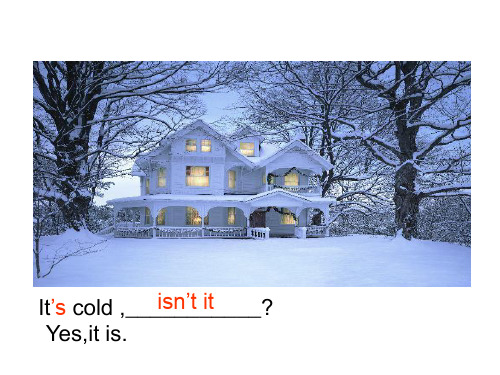
.
7
三、反意疑问句的解答步骤
1. 判定(判断该用肯定还是否定); 2. 找动(找句子的助动词:be用be,动词原形do,三 单does,过去did,完成have); 3. 换代(将主语换为代词);
• Jack wasn’t playing soccer, _w__a_s _h_e___?
• Their parents have gone to London, __h_a_v_e_n_’_t t_h_e_y__?
现在 主语+is (are)…, isn’t (aren’t) + 主语? 过去 主语+was (were)…,wasn’t (weren’t) + 主语?
1 He is your uncle, _i_s_n_’t_h__e_____?
2 You are not students, __a_r_e_y_o_u_____?
5 They have never been to Hong Kong, __h_a_v_e__th_e_y_____?
.
12
5. There be 句型的反意疑问句
There is/are/will be…, isn’t/aren’t/won’t there?
1 There is a pen on the chair,__is_n_’t_t_h_e_re___?
3 The students are going to have a picnic,
__a_re_n_’_t _t_h_e_y___?
4 Kate isn’t from the USA, __is__s_h_e______?
5 He was German, _w_a_s_n_’_t_h_e____?
- 1、下载文档前请自行甄别文档内容的完整性,平台不提供额外的编辑、内容补充、找答案等附加服务。
- 2、"仅部分预览"的文档,不可在线预览部分如存在完整性等问题,可反馈申请退款(可完整预览的文档不适用该条件!)。
- 3、如文档侵犯您的权益,请联系客服反馈,我们会尽快为您处理(人工客服工作时间:9:00-18:30)。
3)陈述部分的主语是I am,疑问部分 要用 aren't I. I am a student, aren’t I? 4) 祈使句的反意疑问句,疑问部分用 will you/won’t you。 Don't do that again, will you?
注意:Let's 开头的祈使句,后 开头的祈使句, 注意 用shall we? Let us 开头的祈使句,后 开头的祈使句, 用will you?
Let's go and listen to the music, shall we? Let us do this job,will you?
5)陈述部分用 no, nothing, nobody, 陈述部分用 never, few, seldom, hardly, rarely, little 等否定含义的词时, 等否定含义的词时,疑问部分用肯定 含义。 He can hardly swim, can he? They seldom come late, do they?
She is a student , isn’t isn t she ? Yes , she is.
• 1.It is a funny animal, isn’t it? Yes , it is .
aren’t 2.They are nice pictures , aren t they? Yes , they are .
They’re playing pingpong,aren’t they ? Yes, they are .
Special disjunctive questions
1)陈述部分是 have to + v. (had to + v.)作谓语,疑问部分常用don‘t + 主语(didn’t +主语)。 We have to leave ,don't we? 2)陈述部分有had better + v. 疑问 句部分用hadn't you? You’d better get up early, hadn’t you?
1.结构 . 陈述句+简短疑问句(助动词\be be动词\ be \ 情态动词+陈述部分主语的相应代词) 2.规律 . 前肯定,后否定 ; 前否定,后肯定 , , +,- ,+) (即前肯后否,前否后肯 ; 又或+,-;-,+) , +, 1.前肯后否或前否后肯 1. 注意:1. 2.两部分人称和时态一致 2.
9) 陈述部分主语是不定代词 everybody, anyone, somebody, nobody, no one等,疑问部分常 用复数they
Everyone knows the answer, don't they? Nobody knows about it, do they?
10)陈述部分是“there be” 结构的,疑问部分用there省 略主语代词。
There is something wrong with your watch, isn't there?
11)否定前缀不能视为否定词, 其反意疑问句仍用否定形式。
It is impossible, isn't it?
注意: 注意: 反义疑问句的回答用 yes, 但是, yes,no 但是,当陈述部分是否 定形式时,回答要按事实。 定形式时,回答要按事实。
isn’t He isn t a good policeman , is he ? No , he isn’t.
They are sleeping , aren’t aren t they ? Yes , they are .
Beckham can’t play football ,can he No, he can’t .
8) 陈述部分主句主语是I \we 谓语动词用think, believe, expect, suppose, imagine 等 引导的宾语从句,疑问部分与宾 语从句相对应构成反意疑问句。 。
I don't think he is bright, is he? We believe she can do it better, can't she?
They don’t work hard, do they? Yes, they do. No, they don’t.
反义疑问句
You had better go now, He is a teacher, She has a book, I can go, He doesn’t like sport, You had breakfast at six this morning,
感叹句中,疑问部分be 6) 感叹句中,疑问部分be + 主语。
What colours, aren't they? What a smell, isn't it? 7)陈述部分主语是指示代词或不定 陈述部分主语是指示代词或不定 代词 everything, that, this nothing, nothing, 疑问部分主语用 it 。 Everything is ready, isn't it?
反义疑问句
There is a radio on the table, We have to get up at four tomorrow, They had to leave early,
反义疑问句 He is unfit for his job, He is hardly 14 years old,
don’t I don t think you are lazy,are you? can’t She can t believe we win the game,
can she ?
反义疑问句
Have a cup of tea, Let’s go there, Let us go there, So that’s your little trick, Your bike is outside,
1.陈述部分肯定式 1.陈述部分肯定式 + 疑问部分否定 式
They work here, don’t they ? 2.陈述部分否定式 2.陈述部分否定式 + 疑问部分肯定式 You didn’t go, did you? He can’t ride a bike, can he?
She is a doctor, isn’t isn t she ? Yes, she is.
反义疑问句
Everyone knows his job, No one was hurt,
反义疑问句
This is very important, I’m late, One can’t be too careful, I wish to go home now,
12)
陈述部分的谓语是wish, 疑问部分要用may +主语 may + day, isn't it?
反意疑问句
• 含义:
在一个陈述句之后附上一个简短的 疑问句,对陈述句提出相反的疑问, 疑问句,对陈述句提出相反的疑问,这种 疑问句叫反意疑问句。 疑问句叫反意疑问句。 如:
1. SARS is scary, isn’t it? 2. We speak Chinese, don’t we?
I wish to have a word with you, may I?
反义疑问句
I don’t think he can finish the work, You don’t think he can finish the work, What a lovely day,
在宾语从句中,以主句为准, 在宾语从句中,以主句为准, 但如果主语是第一人称且谓语 动词是think, believe等时 等时, 动词是think, believe等时, 以从句为准。 以从句为准。
